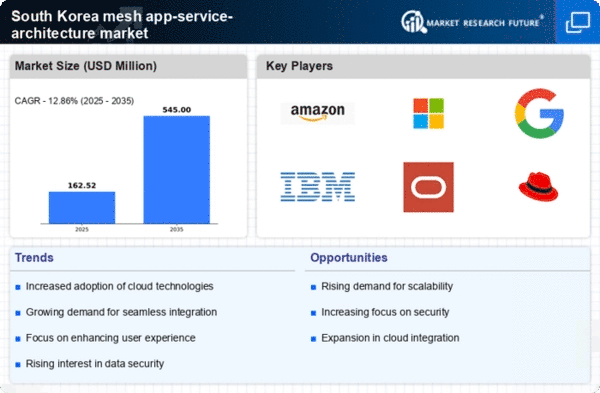Rising Demand for Scalability
The mesh app-service-architecture market in South Korea is experiencing a notable surge in demand for scalable solutions. As businesses increasingly seek to enhance their operational efficiency, the ability to scale applications seamlessly becomes paramount. This trend is particularly evident in sectors such as finance and e-commerce, where rapid growth necessitates flexible architectures. According to recent data, approximately 70% of enterprises in South Korea are prioritizing scalability in their IT strategies. This shift is driving investments in mesh app-service architectures, which offer the agility required to adapt to fluctuating market conditions. Furthermore, the integration of cloud technologies is facilitating this scalability, allowing organizations to deploy resources dynamically. Consequently, the mesh app-service-architecture market is poised for substantial growth as companies recognize the importance of scalable solutions in maintaining competitive advantage.
Growing Emphasis on Cost Efficiency
Cost efficiency is becoming a pivotal consideration for organizations in South Korea, significantly influencing the mesh app-service-architecture market. As companies face increasing pressure to optimize their budgets, the adoption of cost-effective architectures is gaining traction. The mesh app-service-architecture model allows for the efficient allocation of resources, reducing operational costs while maintaining high performance. Recent analyses suggest that businesses can achieve up to 30% savings in IT expenditures by transitioning to this architecture. This financial incentive is particularly appealing to small and medium-sized enterprises (SMEs) that are looking to maximize their return on investment. As a result, the mesh app-service-architecture market is likely to witness accelerated growth as organizations prioritize cost efficiency in their technological investments.
Increased Focus on Interoperability
Interoperability is emerging as a critical driver within the mesh app-service-architecture market in South Korea. As organizations adopt diverse technologies and platforms, the need for seamless integration across systems becomes increasingly vital. This trend is particularly pronounced in industries such as healthcare and telecommunications, where disparate systems must communicate effectively. Recent surveys indicate that over 60% of South Korean companies are investing in solutions that enhance interoperability. The mesh app-service-architecture framework facilitates this integration by enabling different services to work together harmoniously. This capability not only streamlines operations but also enhances data sharing and collaboration among stakeholders. As businesses strive to create cohesive ecosystems, the demand for interoperable solutions within the mesh app-service-architecture market is expected to rise significantly, fostering innovation and efficiency.
Advancements in Network Infrastructure
The evolution of network infrastructure in South Korea is playing a crucial role in shaping the mesh app-service-architecture market. With the rollout of 5G technology and improvements in broadband connectivity, organizations are now able to leverage high-speed networks to support complex applications. This advancement facilitates the deployment of mesh architectures, which require robust and reliable network capabilities. As a result, businesses are increasingly adopting these architectures to enhance their service delivery and user experience. Current estimates indicate that the 5G penetration rate in South Korea is projected to reach 50% by the end of 2025, further driving the demand for mesh app-service architectures. Consequently, the synergy between advanced network infrastructure and mesh architectures is expected to propel market growth significantly.
Regulatory Compliance and Data Governance
Regulatory compliance and data governance are becoming increasingly critical in the mesh app-service-architecture market in South Korea. As data protection regulations tighten, organizations are compelled to adopt architectures that ensure compliance with legal standards. The mesh app-service-architecture model offers enhanced capabilities for data management and security, making it an attractive option for businesses aiming to meet regulatory requirements. Recent reports indicate that approximately 75% of South Korean firms are prioritizing compliance in their IT strategies. This focus on governance not only mitigates risks but also fosters trust among consumers. As organizations navigate the complexities of regulatory landscapes, the mesh app-service-architecture market is likely to expand as companies seek solutions that align with compliance mandates.
















